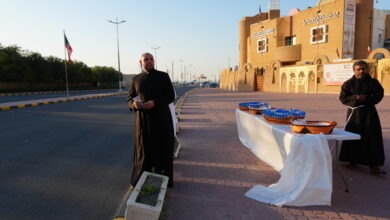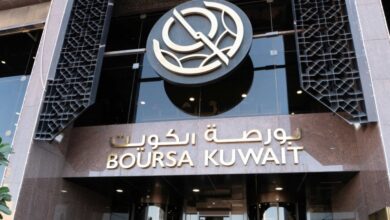US Ambassador-at-Large Dyer proposes measures in combating human trafficking in Kuwait

The US Ambassador-at-Large, Cindy Dyer praised Kuwait’s continued efforts in combating human trafficking during a recent statement, emphasizing the country’s commitment to international laws and regulations. Kuwait’s increased efforts in this area were noted in the 2024 annual report by the U.S. Department of State, which kept Kuwait’s ranking unchanged in the second tier of the ‘Watch List’ for human trafficking for the third consecutive year.
Ambassador Dyer highlighted Kuwait’s progress in addressing human trafficking, including its adherence to global standards, though she noted that further improvements are still needed to fully address the issue.
In an interview with Al-Qabas on the sidelines of her first visit to the country last week, Dyer described the Kuwaiti legislation as very good ‘as it effectively criminalizes both human trafficking and forced labor, with a penalty of long prison terms, which is good.’
Ambassador Dyer shared that Kuwait is already struggling with something that many countries are struggling with the full implementation of their legislation, yet there is good progress. For example the implementation of the previously drafted National Mechanism for the Referral Mechanism for Victims of Human Trafficking, which is used to monitor and identify cases of human, trafficking, is a good indicator.
Trial and Conviction
Ambassador Dyer stressed that ‘Last year, it was noticed that there was only one trial and conviction, which included 5 defendants, and that’s a good thing. Here Kuwait can work more in this aspect and maybe try to seek more investigations, prosecutions and convictions, as holding traffickers accountable is important.’
Ambassador Cindy Dyer further praised Kuwait’s efforts in combating human trafficking, specifically highlighting the country’s national action plan and progress in identifying male victims of trafficking, an important step forward.
The U.S. State Department’s 2024 report acknowledged Kuwait’s shelter and service center for female victims, while also recommending the establishment of a shelter specifically for male victims of trafficking.
This recommendation aims to ensure that all victims, regardless of gender, receive appropriate support and protection. Kuwait’s continued focus on enhancing its systems for victim support was noted as an important part of its ongoing efforts in this area.
On the most widespread types of human trafficking in Kuwait, Dyer stated that Kuwait is similar to other countries where it is witnessing an increase in compulsory forced labor, and this not only in Kuwait, but globally.
Thank you for an effort
Ambassador Dyer praised the tireless efforts of the First Deputy Prime Minister, Minister of Defense and Minister of Interior, H. E. Sheikh Fahad Al-Yousef, in the field of combating human trafficking, and stressed the immediate dealing with any company that is not committed to giving its workers’ wages and taking legal action against them.
Ambassador Dyer emphasized the importance of timely wage payments in combating labor exploitation, noting that delays or non-payment of wages can be a dangerous indicator of forced labor.
Expressing gratitude, Ambassador Dyer praised Kuwait’s focus on ensuring fair wages for workers and highlighted the launch of an electronic reporting service for human trafficking crimes in October, aimed at facilitating the reporting of violations. This service is a step forward in providing better access to justice and supporting efforts to combat human trafficking and labor abuse.
Ambassador Dyer reiterated concerns about the sponsorship system, noting that aspects of it can expose workers to human trafficking by limiting their ability to leave exploitative jobs. She emphasized that the system’s restrictions, if abused, make it harder for workers to escape unfavorable or abusive working conditions.
This longstanding issue has been well-documented in human trafficking reports, with Dyer stressing the need for reform to prevent further exploitation. The sponsorship system has been a key focus of criticism in efforts to combat human trafficking globally.
Ambassador Dyer expressed longstanding concerns about the sponsorship system, noting that it can increase workers’ vulnerability to human trafficking by restricting their ability to leave exploitative jobs. She emphasized that this limitation, if misused, contributes to labor exploitation and highlights the need for reform to prevent such abuse.
Sponsor System
Extending her suggestions, Ambassador Dyer advised that Kuwait consider alternative amendments to the sponsorship system, based on feedback from civil society organizations in the country. These groups have expressed interest in exploring new methods for issuing visas and employment contracts.
Moreover, she emphasized that these alternative options, proposed by non-governmental organizations, could provide better solutions to reduce the risks of exploitation and human trafficking.
In response to questions about criticism of the U.S. for politicizing human rights issues in the Gulf, Ambassador Dyer clarified that the U.S. is required by law to assess human trafficking and human rights conditions in every country, including Gulf States.
She emphasized that these evaluations are conducted across 188 countries, including the U.S. itself, and are not selective. This systematic approach ensures a comprehensive and impartial review of government efforts worldwide.
Men’s Shelter Center
The US Ambassador-at-Large, Cindy Dyer, expressed her admiration for the men’s shelter center she visited during her trip to Kuwait, highlighting its positive features.
Ambassador Dyer praised the facility, which will soon be opened under the supervision of Kuwait’s Ministry of Interior, for its excellent recreational and sports amenities. She also noted the inclusion of a dedicated room for NGOs and civil society organizations, which she found particularly encouraging.
Ambassador Dyer emphasized that the government-run shelter reflects a significant step forward in addressing the needs of male victims of trafficking and exploitation.
Protection of Domestic Workers
Ambassador Dyer assessed the protection measures for domestic workers in Kuwait, highlighting the challenges in controlling recruitment companies abroad, such as in the Philippines or India.
She noted that while Kuwait cannot directly regulate these foreign recruitment agencies, both the Philippines and India must ensure that their recruitment practices are transparent and honest.
Furthermore, Ambassador Dyer emphasized that Kuwait can enhance its control and oversight of local recruitment agencies to ensure workers’ rights are respected, including honest claims regarding working hours or monthly salaries.
Electronic Services – ‘Sahel’
Regarding the app, Ambassador Dyer praised Kuwait’s use of electronic services like the ‘Sahel’ application, which she sees as a positive step in assisting workers who may face forced labor or abuse.
She emphasized that such platforms are especially valuable for domestic workers who may have difficulty accessing physical shelters or services. The electronic system allows these workers to seek help more easily, making it a crucial tool in Kuwait’s ongoing efforts to protect vulnerable laborers.
Ambassador Dyer highlighted the importance of the ‘Sahel’ application available in both Arabic and English, acknowledging that many users of the service might speak other languages.
She suggested that Kuwait could expand the app’s accessibility by offering it in additional commonly spoken languages to ensure that more workers can access the services they need.
This would further enhance Kuwait’s ability to support vulnerable workers and ensure that assistance is available to those who need it most.
6 demands to combat “human trafficking”
- Commitment of international conventions to protect victims of human trafficking.
- Finding alternatives or making amendments to the sponsorship system.
- Tightening supervision of recruitment agencies and companies.
- Providing a shelter center and service provider for male victims.
- Increase prosecutions and accountability of accused.
- Establishing a partnership between the government and civil society institutions.












